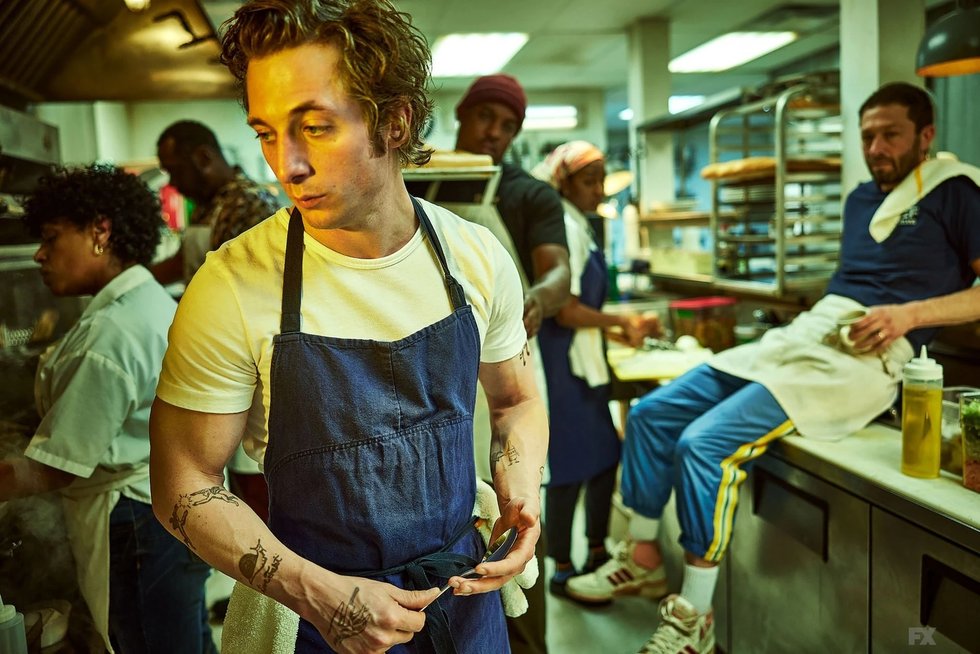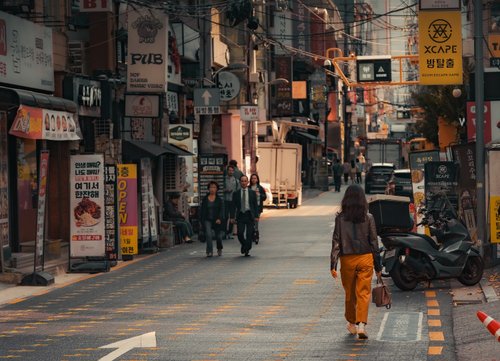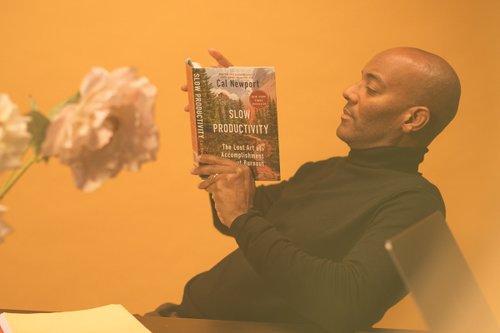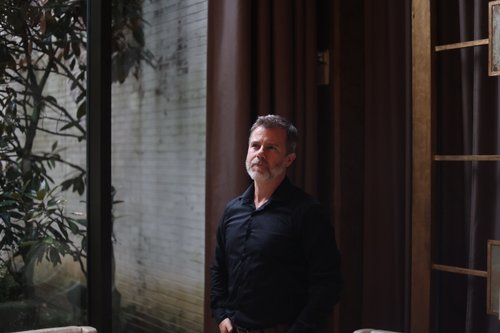The Bear: When professional passion turns toxic
31. 12. 2024
6 min.


Journalist and editor
Last year, the second season of The Bear swept the Golden Globes, and in two weeks it will return again as the series with the most nominations. Up for awards in five different categories, it’s clear that this series has struck a chord with many Americans. Hailed by critics not just for its wry humor and talented cast, but also for its accurate depiction of a toxic workplace. The culinary industry is notorious for its demanding and unforgiving culture, especially as you rise higher in the ranks. To examine the intense dynamics of a professional kitchen, The Bear opens a window into the mad dash to create a Michelin-level restaurant out of thin air.
Professional chefs require a level of skill and passion for their work that goes beyond what you might find in a corporate office as talented cooks transform food into art, success in the industry depends on constant evolution, and more importantly, perfection. So, what happens when the high-stakes world of Michelin-star cuisine collides with a minefield of dysfunctional personal relationships? Is it possible to foster a healthy workplace environment when the boundaries between personal and professional are abandoned?
Warning: Contains spoilers.
Good vision, bad baggage
The Bear begins when Carmy (Jeremy Allen White), a young Michelin-starred chef, returns to his hometown of Chicago after the death of his brother. In an attempt to reconnect with his past (and possibly escape his present), he decides to embark on a journey to turn his brother’s old sandwich shop into a new restaurant, with one clear goal: to earn a Michelin star. As an award-winning culinary prodigy, Carmy has the skills and knowledge to make the restaurant a success, but it’s his emotions and relationships that will decide the fate of the restaurant.
To help him whip the kitchen staff into shape, he hires a young “stagiaire” chef, Sydney (Ayo Edebiri). Like Carmy, who fled his position—and toxic manager—in a famous New York restaurant after a traumatic on-the-job incident, Sydney also wants to prove herself and build her skills after her catering business failed.
The two become friends and business partners, but the strict hierarchy of professional kitchens and Carmy’s inability to reconcile his personal and professional trauma constantly jeopardize their relationship, the business, and their mutual success.
Carmy’s battle with workplace-related PTSD
Although Carmy is a highly skilled chef, his family life—unprocessed grief over the tragic death of his brother, a strained relationship with his sister and cousin who are helping him run the business, and a narcissistic mother—as well as his toxic work history continually weigh him down.
While we usually think of post-traumatic stress disorder as reserved for victims of violent trauma, workplace PTSD is a real phenomenon, and Carmy’s experience in New York is depicted as a crippling, panic-inducing anxiety that plagues him throughout the series.
We see Carmy’s past through flashbacks in toxic kitchens, particularly revolving around his relationship with his former boss and mentor, Chef David (Joel McHale). We see the nature of their dynamic (which we are led to believe is not uncommon in the culinary industry) as Chef David constantly berates Carmy. While he exists mostly in Carmy’s flashbacks, David remains a voice in his head, a personification of his imposter syndrome and low self-esteem.
While most of us put old toxic managers out of mind once we leave a company, it’s not so simple for workers suffering from workplace PTSD, and Carmy’s experience is not unique. According to Dr. Beth Kaplan, global speaker and author on workplace wellbeing, there are a wide range of effects that can follow you to a new environment.
“In the workplace, individuals with PTSD may struggle to form positive relationships with their coworkers and feel excluded or unsupported by their employers,” she says. “They may also struggle with feelings of mistrust and may find it challenging to create meaningful connections with others.
In addition, workplace-related PTSD can also impact an individual’s self-esteem and self-worth. They may feel a sense of shame or embarrassment about their experiences and feel like they don’t belong because of their trauma.” These mimic the common symptoms of general PTSD, such as flashbacks, irritability, emotional avoidance, and negative beliefs, all things Carmy struggles with throughout the series.
What makes a workplace toxic?
In the series, it’s clear that Carmy struggles not to bring the toxicity of his last job into the new restaurant. His staff often find themselves dealing with petty arguments, financial troubles, and many other hurdles that come with building a restaurant. Viewers are left constantly asking, “Is Carmy going to create the same workplace environment that left him so broken? Is he becoming his own staff’s Chef David?”
However, disliking your boss or quarreling with a colleague doesn’t make a workplace toxic. Truly toxic environments that result in trauma and turnover have much deeper issues embedded not in individual relationships but in the workplace culture.
While professional relationships may not be as strong as personal ones, they are still human connections that leave an impact. We may experience different triggers or dynamics that make a workplace toxic, and that can be tied to our life outside of work, as it is for Carmy. In one episode consisting entirely of a flashback, Carmy returns to Chicago to spend Christmas with his family. Here viewers can see a more intimate portrait of their complex family dynamics and how they reflect in the present-day workplace.
Carmy’s mother, Donna (Jamie Lee Curtis) is in a frenzy preparing the meal, and fans gain an insight into the family’s personal relationship with food and its connection to their cultural heritage. Throughout the evening, Donna and other family members become increasingly volatile despite Carmy’s attempts to diffuse the situation, finally coming to blows. Here one can see the close relationship between food, family, and trauma in Carmy’s life, the immense pressure he puts on himself, and how this translates to his workplace dynamic.
Caught in the cycle
Workplace trauma can impact workers in any profession, but the service industry is known to be a high-stress industry. In fact, hospitality workers have the highest turnover rate of any field at around 80% on average.
Things like poor work-life balance, lack of recognition, toxic culture, and burnout are major causes of declining mental health and high turnover. These issues are especially prevalent in the food service industry. One survey of professional chefs discovered that 4 out of 5 workers in restaurants experienced mental health struggles due to their work, with the most common causes being a lack of work-life balance, long hours, pressure from colleagues, and an absence of emotional support in the workplace.
In a profession with poor work-life balance, toxic work environments can take an even greater toll on personal lives and mental health, as over 60% of chefs in the survey reported not having time for personal relationships, increased stress and fatigue related to their work, and nearly one third relied on drugs or alcohol as a result of their job.
This is another important issue addressed in The Bear as Carmy is forced to fire one of his staff on opening night for doing drugs while on the clock due to the pressure of keeping up with the intense service requirements. Carmy also struggles with addiction as a result of his personal and professional trauma and is encouraged by his sister to attend Alcoholics Anonymous meetings (though he himself doesn’t drink).
During a 7-minute monologue at one meeting, Carmy shares with the group his reason for becoming a chef, how he bonded with his brother over cooking as a child, and when his brother cut him off, he embarked on his culinary career as a way to prove to his family that he was good enough.
He also alludes to the abuse he suffered during his time training, which is finally directly addressed when Chef David dines at Carmy’s new restaurant. He confronts his old boss, but instead of telling him off as one might like to a bad manager, he reveals the deeper emotional trauma that David inflicted on him, admitting that he thinks about him “too much.”
When asked if he realized the impact he had, David’s response is far from the closure Carmy hoped for: “You were an OK chef when you started with me, and you left an excellent chef…so you’re welcome.”
Now, Carmy finds himself in the role of mentor when it comes to Sydney, a task he is not sure he is up to. They are both aware of how easy it is to slip into toxicity when tensions are high in the kitchen, and Carmy does not want their relationship to mimic industry norms. The pair even create secret signals to apologize to each other in the kitchen and de-escalate situations.
However, despite his best efforts, Carmy begins to dismiss Sydney, ignore her ideas, and steamroll her when it comes to decisions about the business they are supposedly equal partners in. At the end of season 3, Sydney is left with a choice to become the head chef at another restaurant or stay with Carmy in what appears to be an unsustainable situation. Again, personal relationships are tied to her professional decisions, and it’s clear how difficult it is to break the cycle of toxicity in such a high-stress profession.
Throughout The Bear, the series explores the complex nature of personal dynamics in the workplace and their impact not only on people’s performance but also on their mental health and relationships outside of work. While the culinary scene is a fascinating lens to examine what happens when professional boundaries are blurred, the effects of workplace trauma, and much more, the difficult subject matter it broaches is relatable to workers in any profession.
Photo: © FX Networks
Follow Welcome to the Jungle on Facebook, LinkedIn, and Instagram and subscribe to our newsletter to get our latest articles every week!

Viac inšpirácie: Future of Work

The youth have spoken: South Korea’s push for a four-day workweek
Is this the end of Korean hustle culture?
26. 12. 2024

Cal Newport's Slow Productivity: Redefining success in a hustle culture
Is slowing down the key to achieving more?
19. 12. 2024

Wellbeing washing: Are workplace mental health apps doing more harm than good?
Workers are struggling with mental health. Are employers approaching it the right way?
19. 12. 2024

Dark side of DINKs: Working as a childfree adult
Having children comes with challenges. So does choosing not to.
11. 12. 2024

Debunking the American Dream with Benjamin C. Waterhouse
Has our economic past and the rise of gig work poisoned our ideas of success?
13. 11. 2024
Vnútri džungle: HR newsletter
Štúdie, udalosti, odborné analýzy, riešenia... Každé dva týždne vo vašej poštovej schránke.

Ste hrdí na vašu firemnú kultúru?
Poskytnite jej viditeľnosť, ktorú si zaslúži.
Zistite viac o tom, ako propagovať firemnú kultúru.